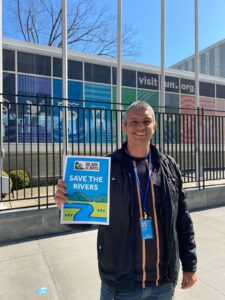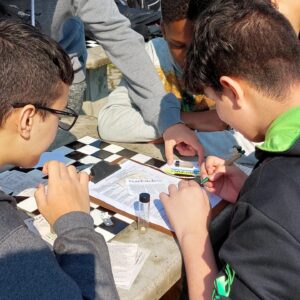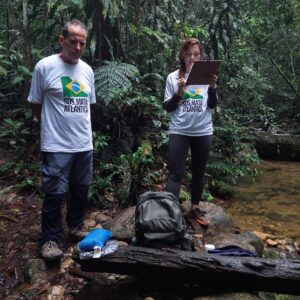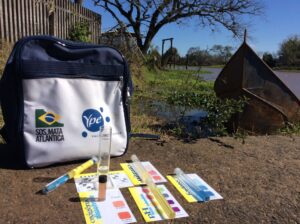World Water Day: Less than 7% of rivers in the Brazilian Atlantic Forest have good water quality
22 de março de 2023A study by the SOS Mata Atlântica Foundation reveals that in the last year, there has been no significant improvement in the water quality of rivers in the Atlantic Forest monitored by volunteers from the organization. In the biome where more than 70% of the Brazilian population lives, only 6.9% of the analyzed points showed good water quality. The research found regular quality in 75% of cases, poor in 16.2%, and very poor in 1.9%, and no samples that could be considered excellent were recorded. Therefore, almost 20% of the analyzed points do not have minimum conditions for multiple water uses – such as agriculture, industry, human supply, animal consumption, leisure, or sports practice.
The data are from the 2023 edition of the “Water Quality Portrait in the Watersheds of the Atlantic Forest” study, carried out by the Observing the Rivers program of SOS Mata Atlântica, which is sponsored by Brazilian company Ypê. For the first time, the results will be presented at the UN Conference on Water, which is being held in New York on March 22, World Water Day. The data emphasize the fragile condition of Brazilian water resources at this moment of climate emergency, demanding immediate attention from governments and society.

According to coordinator Gustavo Veronesi, the precarious situation of basic sanitation in Brazil, where less than half of the population has access to the service, and the degradation of soils and native forests in their watersheds are factors that contribute to this scenario. “We are still far from the targets of Sustainable Development Goal 6, Water and Sanitation, envisaged for 2030, and the universalization of basic sanitation, scheduled for 2033. The monitored rivers reflect the urgency of actions aimed at forest restoration, basic sanitation, Brazil’s climate commitments, and inclusive and participatory governance,” he says.
The report presents the water quality portrait in watershed basins of the biome through data from the Water Quality Index (WQI), collected by a network of 2,700 volunteers who are part of Observing the Rivers. Based on monthly collections between January and December 2022, 990 analyzes were carried out at 160 points of 120 rivers and bodies of water in 74 municipalities in 16 states of the Atlantic Forest. Compared to the 106 points also analyzed in 2021, when there was a reduction in collections due to the Covid-19 pandemic, the average water quality stabilized, with an indication of slight improvement: the points with good quality increased from 7 to 8; those with regular quality from 75 to 80; and those with poor quality decreased from 21 to 15. Like the previous year, there were three points with very poor quality – all of them, once again, in the Pinheiros River in São Paulo.



A river that received positive attention was the Sapateiro stream, in the city of São Paulo, which saw an improvement in its source due to actions taken by the city government in partnership with civil society entities and movements. However, the same stream saw a slight decline at the Ibirapuera Lake point, which had been showing an increasing improvement in water quality in 2021. The Balainho River, in the municipality of Suzano (SP), which underwent structural works for sewage collection and treatment, is also among those that showed improvement, highlighting the cause-and-effect relationship of actions of this nature.
The negative highlight was the Paraíba do Sul River. One of the points in Itaocara (RJ) showed a decline mainly due to the reduction of river flow for most of the year, highlighting the lack of sewage treatment. The same happened in two other points on the northern coast of São Paulo, which are heavily frequented during high season: the Paquera stream, in Ilhabela, and the Maresias stream, in São Sebastião.
Malu Ribeiro, Director of Public Policies at the SOS Mata Atlântica Foundation, explains that one of the organization’s objectives is for access to clean water to be recognized as a fundamental right of Brazilians. “For this, we are mobilized, with our volunteer network of Observing the Rivers and partners, for the approval of the Constitutional Amendment Proposal (PEC No. 06/2021) in the Brazilian Congress. The achievement of the fundamental right to clean water for all will be the result of a long-term process of consistent public policies and environmental sanitation and conservation projects in the country’s watersheds,” she adds.
The study is available for download here.



About Observing the Rivers
Observing the Rivers is a project that brings together communities and mobilizes them to monitor the water quality of rivers, streams, and other bodies of water in the areas where they live. Water monitoring is carried out with a methodology developed by SOS Mata Atlântica, which uses an analysis kit and perception indicators to raise the Water Quality Index (WQI), which is an international standard adopted to evaluate the environmental condition of freshwater and regulated in Brazil by CONAMA Resolution 357/2005. Volunteer groups collect and measure water quality once a month and make the results available in an online database. The indicators raised by all monitoring groups are gathered in annual technical reports that form the portrait of the water quality of rivers in the 17 states of the Atlantic Forest.
About SOS Mata Atlântica Foundation
SOS Mata Atlântica Foundation is a Brazilian environmental NGO whose mission is to inspire society to defend the Atlantic Forest, which is the most devastated forest in the country. Its priorities include combating climate change, forest restoration, protecting biodiversity, and ensuring clean water for all. The foundation promotes public policies for the conservation of the most threatened biome in Brazil through forest monitoring, producing studies, demonstrative projects, dialogue with public and private sectors, improving environmental legislation, communication, and engaging society.
About Ypê



As a leading brand in important cleaning categories in Brazil, Ypê offers a complete line of products to assist with laundry, household, and personal care. With its headquarters located in Amparo, São Paulo state, Ypê has four more manufacturing units: Salto (SP), Simões Filho (BA), Anápolis (GO), and Goiânia (GO). Founded in 1950, Ypê is a 100% Brazilian company with over 6,500 employees. The company is a signatory of the Business Pact for Integrity and Against Corruption, an initiative of the Ethos Institute of Business and Social Responsibility. Ypê exports to over 10 countries in Latin America, Asia, Africa, and the Middle East and also owns the Atol, Assolan, Tixan, and Perfex brands.